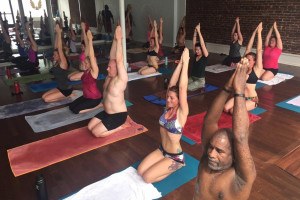Meet a Health Hero: Deborah Hirsch
>> Vote in the Health Hero Challenge here!
Name: Deborah Hirsch
Occupation: President, co-founder and instructor, Philly Dance Fitness
Who or what motivates you to be healthy?
At the risk of sounding cheesy, my underlying motivation for being healthy is the fact that I love life and I want to live as long as possible. I’m reminded of a refrain my parents often say: “If you don’t have your health, you don’t have anything.” Maybe you still have some things, but you certainly can’t take full advantage of what life has to offer if you’re bed-bound by cancer or so overweight that getting anywhere becomes a time-consuming burden. I also have a family history of heart disease, cancer, diabetes and high cholesterol. I can’t control my genetic make-up, but I can do my best to strengthen and take care of my body.
On top of wanting to cram as many experiences as I can into every waking moment, I also love to eat. Some friends have noted that I have a shockingly—maybe even disgustingly—large appetite for someone my size. In order to eat whatever I want (within reason, of course), I know I have to work harder to be healthy in every other aspect of my life. That means no smoking, very minimal drinking and tons of physical activity.
Describe a health- or fitness-related turning point in your life.
Growing up, I was active but not athletic. I was never picked first for sports teams and I’m sure my elementary school gym teacher back in Wisconsin would do a double take if he knew that now I run a fitness business. But I was always, always dancing, from performing in a children’s dance troupe to registering for every possible dance class for non-majors that I could squeeze into my schedule at Northwestern University.
The turning point came a few years after I graduated. I was working full-time as a journalist and salsa dancing in the evening wasn’t satisfying my craving for movement. Meanwhile, I noticed that Zumba and other dance-fitness programs were gaining traction at my local gym. It seemed like I had enough of a dance background to instruct something like that, too, so I signed up for a group exercise certification. With that training completed, I didn’t waste any time taking on my first fitness class. My interest in the field snowballed from there.
Aside from becoming a fitness instructor, launching Philly Dance Fitness in early 2010 was, of course, another monumental turning point. By then, I’d already taught at a number of gyms in Philadelphia and other cities. I wanted to make dance affordable and accessible to anyone, including those who shy away from joining a gym. Running this company has been such a fulfilling way to share my love of dance and fitness with the greater community. The students are the best part. Aside from watching them sweat their way into skinny jeans, many of them had become friends with me and with each other.
What “policy” would you institute to make Philadelphia a healthier city?
I would like to see city council introduce a policy to partner with private insurance companies on a pilot offering rebates for Philadelphia residents who demonstrate long-term participation in fitness programs. Some local companies, including Comcast, already offer these types of programs, but they’re often limited to one small company gym that may not have hours or programs that suit employees. Likewise, there are programs for seniors on Medicare, but not nearly as many for younger or middle-aged workers who could potentially save insurance companies significant dollars if they had more incentive to stay healthy now.
I envision the city becoming a sort of clearinghouse for this pilot by engaging local businesses, from gyms to independent yoga studios, to participate and working with insurance companies to set up the logistics. Ideally, participants would be able to go to any facility on the city-approved list—or multiple facilities—to count toward whatever minimum number of fitness visits are required to receive a rebate. Unlike current incentive programs, this would expose the community to the wide range of fitness options available in Philadelphia, benefitting consumers, local businesses, insurance providers and the city all at once.
What’s the most important part of your health or fitness regimen?
Commitment. Every month I make slight adjustments to my teaching and workout schedule, and then I stick to it. I don’t allow myself to make excuses to skip a workout, even if I’m under the weather. In fact, I only get substitutes for my classes if I’m seriously sick. (Case in point: I’m 19 weeks pregnant and even though I don’t always feel so hot, I plan to continue teaching until a month before I’m due if my body can handle it.)
What is your No. 1 piece of health-related advice or encouragement?
Find whatever it is that motivates you to workout. For me, it was dancing. I could literally dance all day if I could. (I did a 30-hour dance marathon twice in college to raise money for charity, and I would do it again!) Because I love dancing so much, it’s not a chore to teach or attend a dance fitness class. I have similarly grown to love other types of group fitness, from kickboxing to sculpting—but don’t ask me to run on a treadmill!
A workout, true to the name, involves work: You can’t expect to burn calories or build muscle without exerting energy. That doesn’t mean it has to feel like work. If the thought of weight-lifting makes your eyes glaze over, try a personal trainer or group class or a high-intensity interval training video until you find a strength-training regimen that gets you excited to sweat. Whether it’s competing in races, playing physically demanding Kinect video games at home, or joining an intramural sports team, there are so many ways to stay in shape. Sometimes the hardest step is just taking the time to figure out which is the right way for you.


